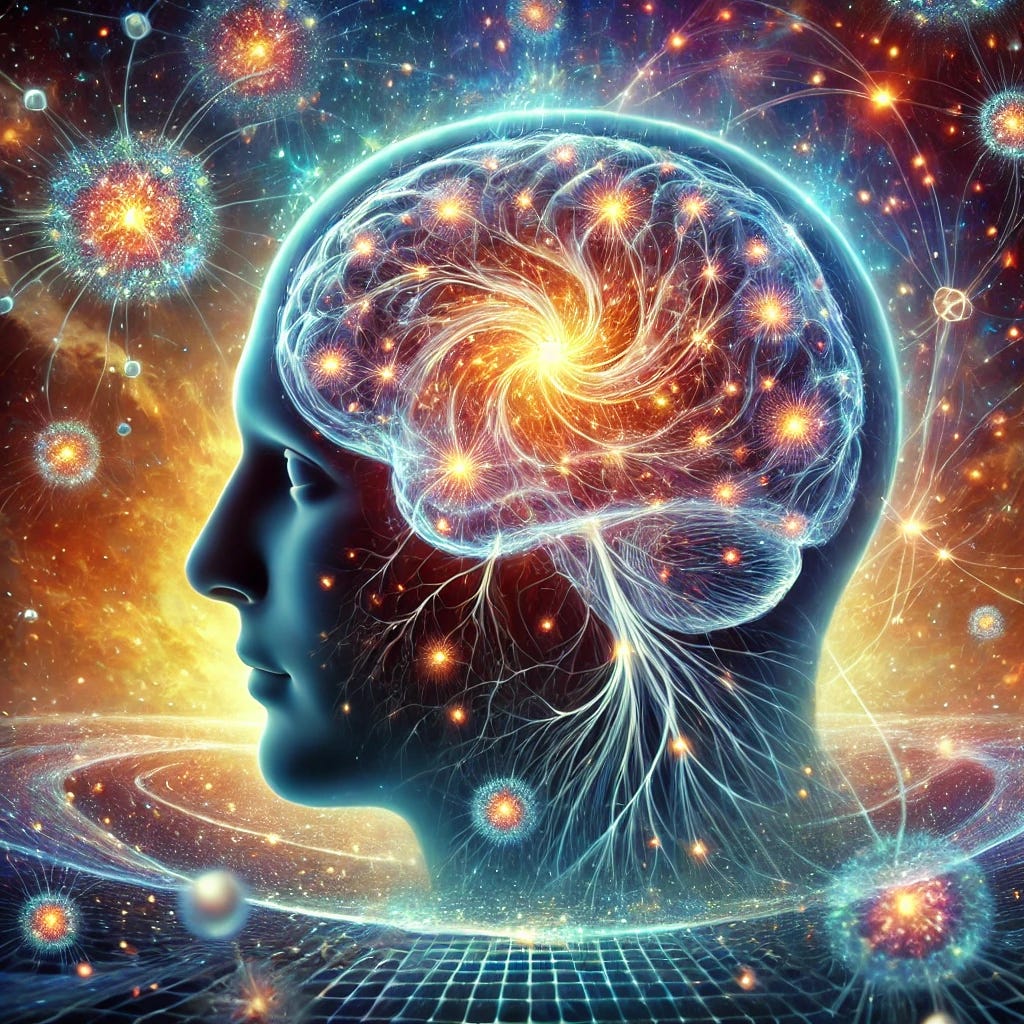Quantum Consciousness
Could the Mind Be a Quantum Computer?
For centuries, scientists and philosophers have debated the nature of consciousness. What is it? How does it arise? Is it purely a product of neural activity, or does it emerge from something deeper—perhaps quantum mechanics?
Some researchers propose that the brain exploits quantum phenomena, meaning our thoughts, perceptions, and even free will may originate from the same fundamental rules governing subatomic particles. If true, this theory could revolutionize our understanding of consciousness, reality, and even the possibility of artificial intelligence achieving sentience.
Let's explore the leading theories, evidence, and implications of quantum consciousness.
1. What is Quantum Consciousness?
Quantum consciousness is the idea that quantum mechanics plays a fundamental role in the brain’s ability to think, perceive, and make decisions. Unlike classical physics, which treats the world as deterministic and predictable, quantum mechanics introduces concepts like superposition, entanglement, and wave function collapse, which might be key to how we experience reality.
There are two primary questions:
Does quantum mechanics influence the brain’s processes?
Is consciousness itself a quantum phenomenon?
If the answer to either is yes, it could mean that our thoughts and decisions arise from quantum uncertainty rather than strict cause-and-effect processes.
2. The Standard Neuroscience Model vs. Quantum Consciousness
Most mainstream neuroscientists argue that consciousness arises purely from classical brain processes:
Neurons fire in complex networks.
Synaptic activity transmits signals using electrochemical reactions.
Cognitive functions emerge from billions of interconnected neurons.
This classical model treats the brain as a biological computer, operating like a vast network of on/off switches. However, critics argue that this does not explain the subjective experience of consciousness (often called the "hard problem of consciousness").
If the brain were purely classical, consciousness would simply be a byproduct of neural computation, but that doesn’t explain why we have self-awareness or subjective experience.
3. Theories of Quantum Consciousness
A. Orch-OR Theory (Orchestrated Objective Reduction)
One of the most well-known quantum consciousness theories was proposed by:
Roger Penrose (Physicist)
Stuart Hameroff (Anesthesiologist)
Their theory, Orch-OR (Orchestrated Objective Reduction), suggests:
Quantum superpositions occur in microtubules (tiny structures inside neurons).
These superpositions collapse spontaneously, creating conscious thought.
Instead of being a computational byproduct, consciousness is an intrinsic quantum process.
This idea implies that consciousness is non-local—not just within the brain but possibly connected to the fundamental structure of the universe.
B. Quantum Brain Hypothesis
Another hypothesis suggests that:
Quantum coherence (a delicate state where particles act as a unified wave) occurs in neural processes.
These quantum effects might enable faster-than-classical computation, giving the brain an edge over traditional computers.
Entanglement between neurons or between different regions of the brain could explain the holistic nature of perception.
If true, this could explain:
How we process information at incredible speeds.
Why our brains can "jump" to insights or decisions.
How memory, perception, and cognition might be fundamentally different from classical computation.
4. Is There Evidence for Quantum Effects in the Brain?
There is both supportive and skeptical evidence regarding quantum consciousness:
Possible Evidence FOR Quantum Effects in the Brain:
✅ Quantum Coherence in Biology:
Photosynthesis, bird navigation, and even some enzymatic reactions use quantum coherence, so it's possible that the brain might too.
✅ Neurons Behaving Quantum-Like:
Some experiments suggest that the synchronization of neurons could resemble quantum entanglement.
✅ Microtubules in Neurons Could Support Quantum States:
Microtubules are complex, highly ordered structures inside neurons—potentially suitable for quantum computation.
Challenges to Quantum Consciousness:
❌ The "Warm and Noisy" Problem:
Quantum effects are typically observed in isolated, ultra-cold environments (e.g., quantum computers).
The brain is warm and chaotic, which many argue would prevent quantum coherence.
❌ Lack of Direct Experimental Proof:
So far, no direct evidence of sustained quantum superposition or entanglement has been observed in the brain.
5. Implications of Quantum Consciousness
If consciousness is a quantum phenomenon, the implications are profound:
A. Consciousness Might Not Be Confined to the Brain
If quantum entanglement plays a role, consciousness might extend beyond individual brains.
Could explain near-death experiences, telepathy, or intuitive knowledge.
B. Free Will Might Be Quantum-Driven
Classical physics implies determinism (no real free will).
If brain processes rely on quantum mechanics, then decisions could be non-determined, providing a foundation for free will.
C. AI Might Never Achieve True Consciousness
Classical computers operate on binary logic (1s and 0s).
If consciousness is quantum-based, then classical AI may never replicate it.
A true sentient AI might require quantum computing to mimic human thought.
D. Consciousness Could Be a Fundamental Property of the Universe
Some physicists speculate that consciousness is woven into the fabric of reality.
This aligns with panpsychism, the idea that everything, even particles, might have some degree of awareness.
6. The Final Mystery: Are We Quantum Beings?
The idea that our thoughts, decisions, and self-awareness emerge from the same uncertainty principles that govern the quantum world is both exciting and unsettling. If true, it could mean:
Our minds are not just biological machines but quantum systems.
We may be entangled with the cosmos itself.
Reality might be shaped by observation, and consciousness plays a role in forming the universe itself.
While current evidence is inconclusive, quantum consciousness remains one of the most mind-bending frontiers in both physics and neuroscience.
7. What’s Next?
Quantum consciousness is highly controversial, but as quantum computing advances, new experiments may soon provide answers. Until then, whether consciousness is purely classical or quantum remains one of the greatest mysteries of science.
Would you like to explore: 🔹 How this relates to the simulation hypothesis?
🔹 The possibility of quantum immortality?
🔹 Quantum consciousness and near-death experiences?


